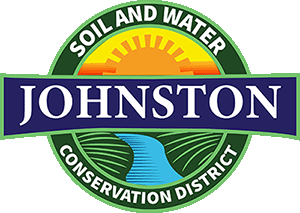
Soil and Water Conservation
Johnston County, North Carolina

Johnston County, North Carolina
The major cause of water quality problems in North Carolina and in the United States is "non-point source" pollution. In many places across our state, damage to our water resources comes from soil erosion, excessive fertilizer use, animal waste contamination, and improper use of agriculture chemicals.
Common agriculture non-point source pollutants are sediment, nitrogen, phosphorus, pathogens, and pesticides. Other non-point sources of pollution include mining, construction, forestry and urban stormwater. The results are higher water treatment costs and polluted wells and groundwater. Water pollution may also cause foul odors, algae blooms, fish kills, and damaged aquatic habitats and stream channels. Such unsuitable conditions decrease the recreational value of our public waters for fishing, boating, and swimming.
The North Carolina Agriculture Cost Share Program was established in 1984 to help reduce the sources of agricultural non-point pollution to North Carolina's waters. The Cost Share program helps owners and renters of established agricultural operations improve their on-farm management by using Best Management Practices, also called BMPs. These BMPs include vegetative, structural, or management systems that can improve the efficiency of farming operations. The results can make farmers more productive while reducing the potential for polluting the surface and ground water.
Your local Soil and Water Conservation District works with the agricultural landowners and renters to:
The District, in conjunction with the Natural Resources Conservation Service, provides free technical assistance to farmers who are willing to implement BMPs to help improve ground and surface water quality.
The North Carolina Soil and Water Conservation Commission designates the BMPs eligible for Cost Share funds and allocates money each year to the Soil and Water Conservation Districts for Cost Share contracts. Since 1984, nearly 25,000 contracts have provided funding for hundreds of farmers to install BMPs on more than one million agricultural acres across the state.
The North Carolina Division of Soil and Water Conservation in the Department of Environment and Natural Resources provides administrative and technical assistance to the Districts. The Division gives final approval to Cost Share contracts and processes requests for payments to farmers participating in the Cost Share program.
The North Carolina Agriculture Cost Share Program is successful because of the grassroots efforts of your Soil and Water Conservation District.
Several BMPs have been approved for the program.
You can be reimbursed up to 75 percent of a predetermined average cost for each BMP installed. Twenty-five percent of the costs are the responsibility of the farmer. The farmer's costs may include the use of existing material and labor.
There are some dollar and acreage restrictions depending on the BMPs used, the type of operation involved, or policy set by the local District or the Commission. Cost Share incentive payments also are available to encourage the use of certain management practices.
If your are a landowner or renter of an existing agricultural operation, you are eligible to participate in the North Carolina Agriculture Cost Share Program.
Visit Johnston Soil and Water Conservation District office to get more information or call 919-934-7156 ext. 3
(Information provided by : Soil & Water Conservation)
Page last updated: March 17, 2023